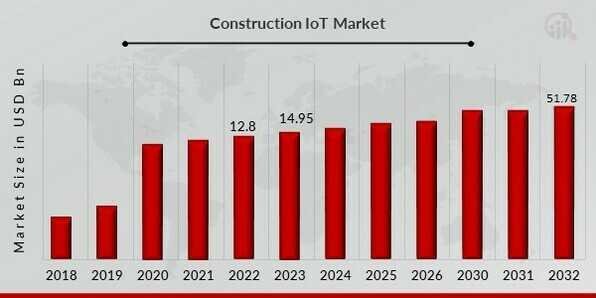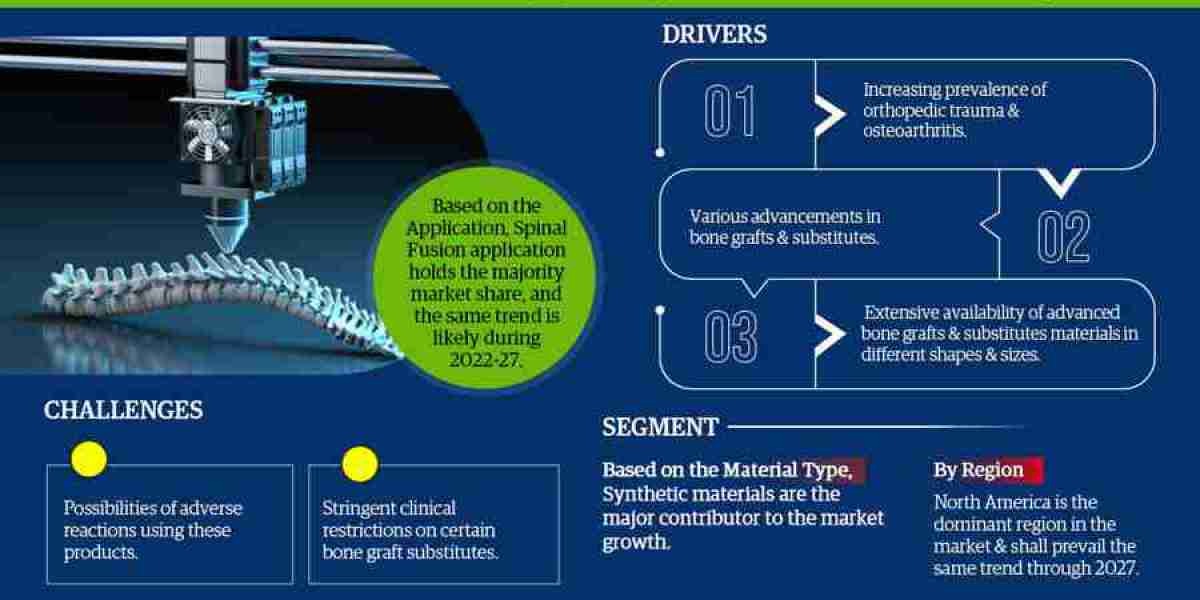In the world of construction, where efficiency, safety, and sustainability are paramount, the integration of Internet of Things (IoT) technology has been nothing short of revolutionary. From smart buildings to connected machinery, IoT is transforming every aspect of the construction industry, driving innovation and improving project outcomes. The Construction IoT Market is experiencing rapid growth, propelled by the need for real-time data, predictive analytics, and automation. Let's delve into how IoT is reshaping the construction landscape.

The Construction IoT Market was valued at US$ 12.82 Bn in 2022 and is expected to reach US$ 51.78 Bn by 2032, at a CAGR of 16.80% during the forecast period.
- Enhanced Safety : Safety is a top priority in construction , and IoT solutions are significantly improving job site safety. Wearable sensors and IoT-enabled equipment can monitor workers' health and detect potential hazards in real-time, preventing accidents before they occur. Moreover, IoT devices can track and manage equipment usage, ensuring proper maintenance and reducing the risk of malfunctions that could endanger workers.
- Optimized Operations : IoT sensors installed in construction machinery and equipment gather valuable data on performance, usage, and location. This data allows construction companies to optimize their operations by scheduling maintenance proactively, minimizing downtime, and maximizing productivity. Real-time monitoring of equipment also enables better resource allocation, leading to cost savings and streamlined project timelines.
- Efficient Resource Management : IoT-enabled sensors can monitor resource consumption on construction sites, such as electricity, water, and materials. By analyzing this data, construction companies can identify inefficiencies and implement strategies to reduce waste and environmental impact. For example, smart building systems can automatically adjust lighting and HVAC systems based on occupancy and ambient conditions, optimizing energy usage without sacrificing comfort.
- Remote Monitoring and Control : With IoT technology, construction managers can remotely monitor job sites and equipment from anywhere in the world. Real-time data streaming allows for immediate intervention in case of emergencies or unexpected issues, minimizing delays and disruptions to the project timeline. Additionally, remote control capabilities enable operators to adjust equipment settings or perform diagnostics without being physically present on-site, improving overall operational efficiency.
- Data-Driven Decision Making : The abundance of data generated by IoT devices in construction provides valuable insights for decision-making. Advanced analytics tools can analyze this data to identify trends, predict potential risks, and optimize processes. From project planning to resource allocation and budgeting, data-driven decision-making enables construction companies to make informed choices that drive project success and profitability.
- Improved Collaboration and Communication : IoT technology facilitates seamless collaboration among stakeholders involved in construction projects. Cloud-based platforms and mobile applications enable real-time sharing of project updates, documents, and communication among architects, engineers, contractors, and clients. This enhances transparency, reduces misunderstandings, and fosters better teamwork, ultimately leading to smoother project execution and higher client satisfaction.
- Future Opportunities : As IoT continues to evolve, the potential for innovation in the construction industry is limitless. Emerging technologies such as drones, augmented reality (AR), and 3D printing are being integrated with IoT to further enhance efficiency, accuracy, and safety in construction processes. Additionally, the adoption of Building Information Modeling (BIM) combined with IoT promises to revolutionize project planning, design, and construction, creating smarter, more sustainable built environments.
In conclusion, the Construction IoT market is poised for exponential growth, driven by the need for increased efficiency, safety, and sustainability in the construction industry. By leveraging IoT technology, construction companies can optimize operations, enhance safety, and deliver projects faster and more cost-effectively. As IoT continues to advance, the possibilities for innovation in construction are limitless, promising a future where buildings are not just structures but intelligent, interconnected ecosystems.
About Market Research Future:
Market Research Future (MRFR) is a global market research company that takes pride in its services, offering a complete and accurate analysis of diverse markets and consumers worldwide. Market Research Future has the distinguished objective of providing optimal quality research and granular research to clients. Our market research studies by products, services, technologies, applications, end users, and market players for global, regional, and country level market segments, enable our clients to see more, know more, and do more, which help answer your most important questions.
Contact:
Market Research Future (Part of Wantstats Research and Media Private Limited )
99 Hudson Street, 5th Floor
New York, NY 10013
United States of America
+1 628 258 0071 (US)
+44 2035 002 764 (UK)
Email: sales@marketresearchfuture.com
Website: https://www.marketresearchfuture.com








